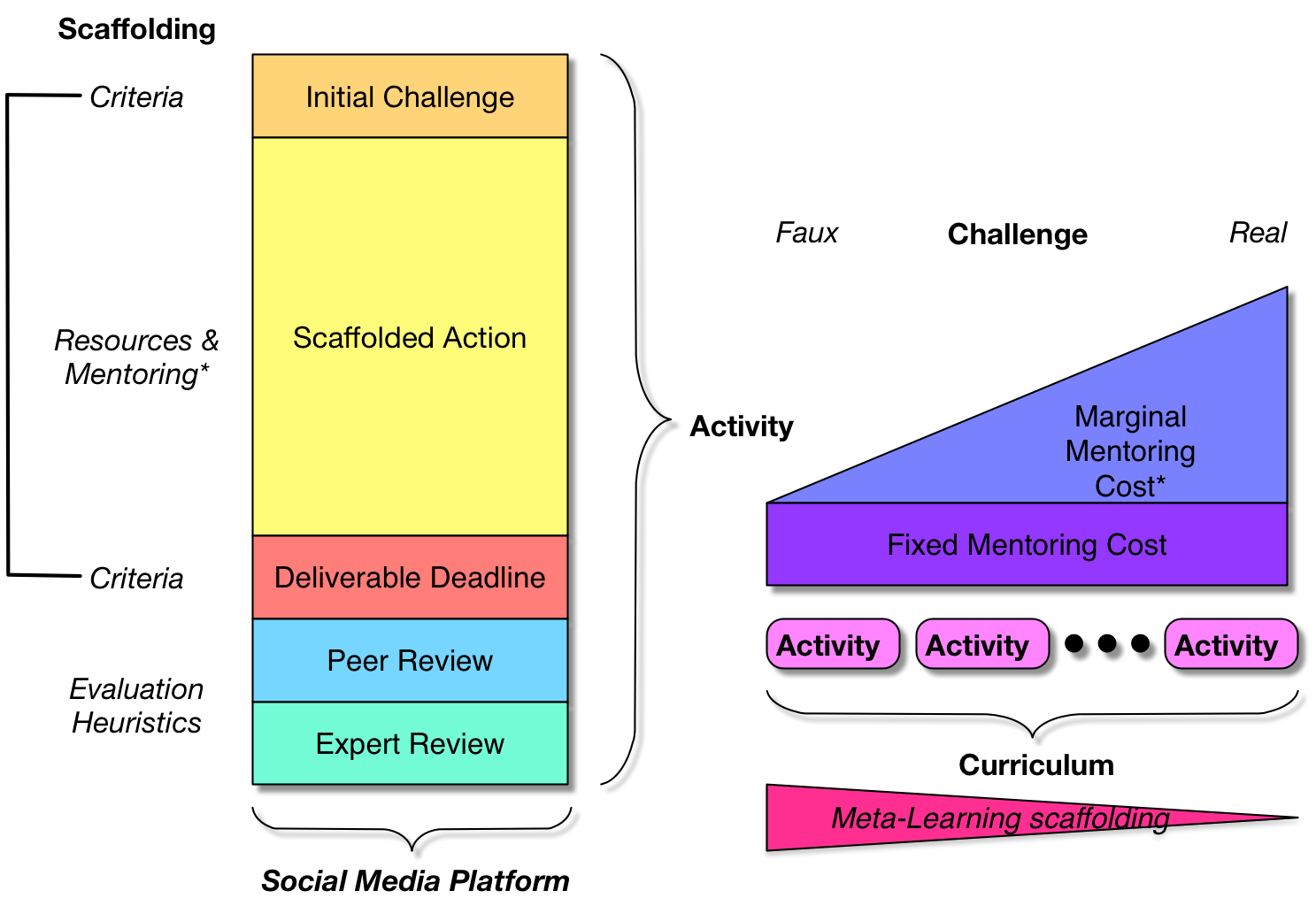I’ve been working on a learning design that integrates developing social media skills with developing specific competencies, aligned with real work. It’s an interesting integration, and I drafted a pedagogy that I believe accomplishes the task. It draws heavily on the notion of activity-based learning. For your consideration.
 The learning process is broken up into a series of activities. Each activity starts with giving the learning teams a deliverable they have to create, with a deadline an appropriate distance out. There are criteria they have to meet, and the challenge is chosen such that it’s within their reach, but out of their grasp. That is, they’ll have to learn some things to accomplish it.
The learning process is broken up into a series of activities. Each activity starts with giving the learning teams a deliverable they have to create, with a deadline an appropriate distance out. There are criteria they have to meet, and the challenge is chosen such that it’s within their reach, but out of their grasp. That is, they’ll have to learn some things to accomplish it.
As they work on the deliverable, they’re supported. They may have resources available to review, ideally curated (and, across the curricula, their responsibility for curating their own resources is developed as part of handing off the responsibility for learning to learn). There may be people available for questions, and they’re also being actively watched and coached (less as they go on).
Now, ideally the goal would be a real deliverable that would achieve an impact on the organization. That, however, takes a fair bit of support to make it a worthwhile investment. Depending on the ability of the learners, you may start with challenges that are like but not necessarily real challenges, such as evaluating a case study or working on a simulation. The costs of mentoring go up as the consequences of the action, but so do the benefits, so it’s likely that the curriculum will similarly get closer to live tasks as it progresses.
At the deadline, the deliverables are shared for peer review, presumably with other teams. In this instance, there is a deliberate intention to have more than one team, as part of the development of the social capabilities. Reviewing others’ work, initially with evaluation heuristics, is part of internalizing the monitoring criteria, on the path to becoming a self-monitoring and self-improving learner. Similarly, the freedom to share work for evaluation is a valuable move on the path to a learning culture. Expert review will follow, to finalize the learning outcomes.
The intent is also that the conversations and collaborations be happening in a social media platform. This is part of helping the teams (and the organization) acquire social media competencies. Sharing, working together, accessing resources, etc. are being used in the platform just as they are used for work. At the end, at least, they are being used for work!
This has emerged as a design that develops both specific work competencies and social competencies in an integrated way. Of course, the proof is when there’s a chance to run it, but in the spirit of working out loud…your thoughts welcome.
Dear Clark Quinn
Thanks for your analysis in “Activities for Integrating Learning”. My excuses for my low level in English writing.
However, I’m very interested by your work about the notion you call “activity-based learning”.
If I understand well, you postulate that:
1) you give the students an activity challenge (problematic situation?). This activity will give at the end a work (delivrable) after a definite time period (deadline). This work will be overwieved by peers or experts to be evaluate.
During the students working time, they can hold resources (human – self, peers or mentor and several sorts of documents – vidéo, texts, audio ….) to accomplish their work.
Question: How do you formalize that activity? By which way? How about managing it? Can you illustrate it by a concrete exemple?
Thanks a lot for your answers. Denis Tabellion (France)
Denis, no worries, your English is better than my any other language! I formalize the activity (e.g. aim the objective at a specific meaningful outcome) by the choice of deliverable. Based upon where they are and where I ask them to go, I should have chosen it such that they’ll have to investigate and experiment with and enact certain relationships in the world that I want them to come to grips with. I don’t believe in pure constructivism, so they’re scaffolded in this with resources (initially, gradually we’ll move to them finding/curating their own to develop their meta-learning skills) and people to ask (and oversight by mentors). It’s facilitated (I don’t think learning can be managed) by paying attention to their interactions: walking around looking at the groups working or the social media equivalent (tracking their actions).
So, for instance, if I wanted folks to understand games design, I might give teams a learning objective and ask them design a game to teach it (I do this in my game design workshops), with interim deliverables of a concept document, an initial storyboard, a more fleshed out storyboard, etc. For cybersecurity, I might flip the goal and ask them to hack a network!
The notion is to take an activity that they end up doing in the workplace, and mocking that up in the learning experience (perhaps with some simpler tasks that build to being able to do it. Does that help?